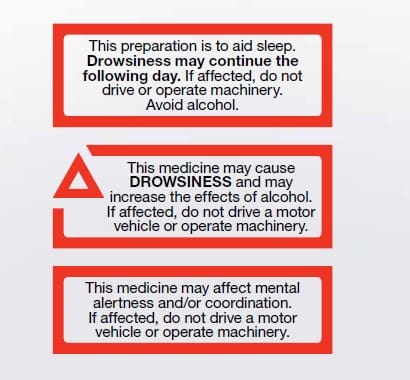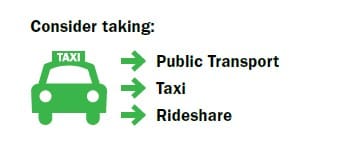How can medicines affect driving?
The impairing effect of some medicines can be equivalent to a Blood Alcohol Content of 0.05 or more.
Common side effects of medicines which can impair your safe driving ability include:
- Drowsiness or tiredness
- Dizziness or feeling faint
- Blurred vision
- Shakiness or unsteadiness
- Confusion and poor concentration
- Slower reaction time
- Nausea
- Mood changes and anxiety
These side effects can affect you as a pedestrian or cyclist too.
Both prescription and non-prescription medicines can impair driving. Effects can vary depending on your age and dose and may be greater when starting a new medicine.
Taking several medicines together can also increase impairment.
Warning labels on medicines can help you understand the effects medicines may have.

Alcohol & medicines
Even small amounts of alcohol can dramatically increase the effect medicine has on driving. Alcohol
and illegal drugs should be avoided completely if you plan to drive.
Which medicines?
Medicines that can impair your driving are often used to treat the following conditions:
- Depression
- Anxiety
- Sleep problems
- Epilepsy
- Emotional or psychological conditions
- Cough, cold and flu symptoms
- Motion sickness
- Pain
- Migraine
Over 400 medicines may affect your driving ability. Consult your doctor or pharmacist to learn about
how your medications may affect you.
Taking medication is common in every stage of life.
But even common medicines can impair your driving ability and place you and others on the road at risk. Research has shown sleeping and anxiety medications (e.g. benzodiazepines) are associated with a 5 times greater risk of a crash
requiring hospitalisation. While antidepressants are associated with twice the risk of a crash requiring hospitalisation.
What to do
- Read medicine labels and ask a doctor or pharmacist if a medicine might affect your driving.
- Ask your doctor for less impairing medicine if available.
- Do not stop taking your medicines or alter dosage without medical advice, this can be very harmful and may put you at risk when driving.
- If planning to drive, do not drink alcohol

If you have concerns about your driving ability, check with your doctor to ensure you are fit to drive. By law, serious and chronic medical conditions that can affect your ability to drive safely must be reported to VicRoads for Medical Review.
For more information visit:
tac.vic.gov.au • nps.org.au
vicroads.vic.gov.au • betterheath.vic.gov.au
Medicines & Road Safety
Call SafeScript Pharmaceutical Helpline for
further information on 1800 737 233.
